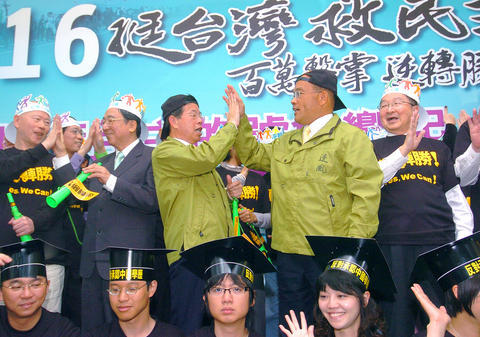Democratic Progressive Party (DPP) presidential candidate Frank Hsieh (
The DPP has asked its supporters to attend a campaign rally, dubbed "Million People High Five, Come-back Win" to wear their baseball caps backward, flash the thumbs-up sign and exchange high fives.
Participants will form a 1,000km line encircling much of Taiwan, and at 3:14 pm begin a 5km march in a counter-clockwise direction to symbolize "reversing the tide" against the KMT's dominance, which claimed 81 of the 113 legislative seats in the January elections.

PHOTO: LU CHUN-WEI, TAIPEI TIMES
The time -- 3:14pm -- was chosen to mark China's enactment of the "Anti-Secession" Law on March 14, 2005.
The KMT is holding simultaneous marches throughout the country, in which participants will wear their caps backward and exchange high fives at 3:14pm.
"It's OK for them to copy [our ideas] as long as it's good for Taiwan," Hsieh at a news conference to promote its campaign rally. "But what's the point of voting for the KMT if it can only follow in the footsteps of the DPP? Why vote for a follower and an imitator?"
Hsieh's running mate, Su Tseng-chang (
Su said KMT presidential candidate Ma Ying-jeou (
For example, after the DPP initiated a referendum to be held alongside the election on joining the UN under the name Taiwan, the KMT "jumped on the bandwagon" and proposed a referendum on regaining UN membership under the name the "Republic of China" or any other "pragmatic" name, Su said.
The KMT yesterday brushed off the DPP's criticism, saying that wearing a hat backward symbolizes an athlete's determination to win by giving his or her last best shot.
"It is a gesture well known to sports lovers. It was not invented by the DPP," KMT communication and cultural committee head Huang Yu-cheng (
Additional reporting by Mo Yan-chih

Taiwanese can file complaints with the Tourism Administration to report travel agencies if their activities caused termination of a person’s citizenship, Mainland Affairs Council Minister Chiu Chui-cheng (邱垂正) said yesterday, after a podcaster highlighted a case in which a person’s citizenship was canceled for receiving a single-use Chinese passport to enter Russia. The council is aware of incidents in which people who signed up through Chinese travel agencies for tours of Russia were told they could obtain Russian visas and fast-track border clearance, Chiu told reporters on the sidelines of an event in Taipei. However, the travel agencies actually applied

Japanese footwear brand Onitsuka Tiger today issued a public apology and said it has suspended an employee amid allegations that the staff member discriminated against a Vietnamese customer at its Taipei 101 store. Posting on the social media platform Threads yesterday, a user said that an employee at the store said that “those shoes are very expensive” when her friend, who is a migrant worker from Vietnam, asked for assistance. The employee then ignored her until she asked again, to which she replied: "We don't have a size 37." The post had amassed nearly 26,000 likes and 916 comments as of this

New measures aimed at making Taiwan more attractive to foreign professionals came into effect this month, the National Development Council said yesterday. Among the changes, international students at Taiwanese universities would be able to work in Taiwan without a work permit in the two years after they graduate, explainer materials provided by the council said. In addition, foreign nationals who graduated from one of the world’s top 200 universities within the past five years can also apply for a two-year open work permit. Previously, those graduates would have needed to apply for a work permit using point-based criteria or have a Taiwanese company

The Shilin District Prosecutors’ Office yesterday indicted two Taiwanese and issued a wanted notice for Pete Liu (劉作虎), founder of Shenzhen-based smartphone manufacturer OnePlus Technology Co (萬普拉斯科技), for allegedly contravening the Act Governing Relations Between the People of the Taiwan Area and the Mainland Area (臺灣地區與大陸地區人民關係條例) by poaching 70 engineers in Taiwan. Liu allegedly traveled to Taiwan at the end of 2014 and met with a Taiwanese man surnamed Lin (林) to discuss establishing a mobile software research and development (R&D) team in Taiwan, prosecutors said. Without approval from the government, Lin, following Liu’s instructions, recruited more than 70 software